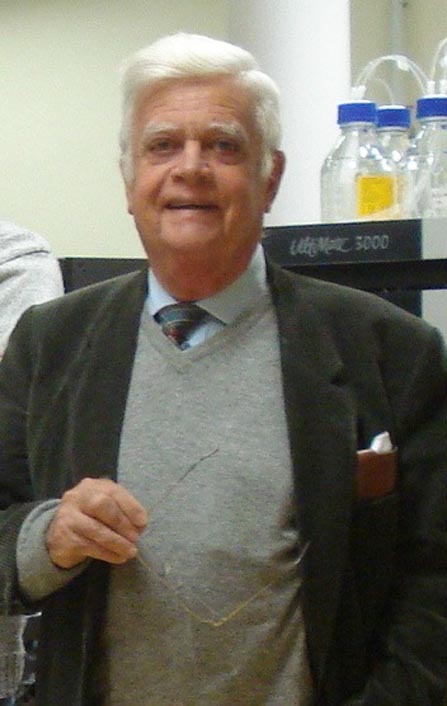Developed skills and lines of research
Lorenzo Pinna graduated in Biological Sciences from the University of Padua in 1962. Between 1965 and 1966, he worked in the United States at the Department of Physiological Chemistry of Johns Hopkins University Medical School in Baltimore. Until 2012, he was a Full Professor at the University of Padua and the Director of the Interdepartmental Research Center for Cellular Signal Studies. He became Emeritus in 2013. His laboratory’s research focused on protein phosphorylation in signal transduction, particularly regarding structure-function analysis and the definition of determinants involved in cell proliferation and apoptosis. In the field of cystic fibrosis, he has made significant contributions to studying the CK2 enzyme and its regulatory function on the CFTR protein.
Projects funded by FFC Ricerca as Principal Investigator or as Research Manager
FFC#3/2011
Subverted signalling by protein kinase CK2 in ∆F508 CFTR expressing cells. Functional aspects and prospects in therapy
FFC#4/2009
Signaling potential of the 508-CFTR mutation: a new paradigm to explain nonchannellophaty related aspects of cystic fibrosis
FFC #4/2007
Assessing the implication of protein kinase CK2 in cystic fibrosis pathogenesis
Publications from FFC Research projects
Pagano MA, Arrigoni G, Marin O, et al. Modulation of protein kinase CK2 activity by fragments of CFTR encompassing F508 may reflectfunctional links with cystic fibrosis pathogenesis. Biochemistry. 2008 Jul 29;47(30):7925-36. doi: 10.1021/bi800316z. Epub 2008 Jul 3.
Pagano MA, Marin O, Cozza G, et al. Cystic fibrosis transmembrane regulator fragments with the Phe508 deletion exert a dualallosteric control over the master kinase CK2. Biochem J, 2010 Jan 27;426(1):19-29. doi: 10.1042/BJ20090813.
Ruzzene M, Pinna LA. Addiction to protein kinase CK2: a common denominator of diverse cancer cells? Biochim Biophys Acta, 2010 Mar;1804(3):499-504. doi: 10.1016/j.bbapap.2009.07.018. Epub 2009 Aug 6.
Salvi M, Cesaro L, Pinna L. Variable contribution of protein kinases to the generation of the human phosphoproteome: a global weblogo analysis. Biomol Concepts, 2010 Aug 1;1(2):185-95. doi: 10.1515/bmc.2010.013.
Salvi M, Cesaro L, Tibaldi E, Pinna L. Motif analysis of phosphosites discloses a potential prominent role of the Golgi casein kinase(GCK) in the generation of human plasma phospho-proteome. J Proteome Res, 2010 Jun 4;9(6):3335-8. doi: 10.1021/pr100058r.
Ruzzene M, Di Maira G, Tosoni K, Pinna L. Assessment of CK2 constitutive activity in cancer cells. Methods Enzymol, 2010;484:495-514. doi: 10.1016/B978-0-12-381298-8.00024-1.
Tosoni K, Stobbart M, Cassidy DM et al. CFTR mutations altering CFTR fragmentation. Biochem J. 2013 Jan 1;449(1):295-305. doi: 10.1042/BJ20121240.
Cesaro L, Marin O, Venerando A, et al. Phosphorylation of cystic fibrosis transmembrane conductance regulator (CFTR) serine-511 by the combined action of tyrosine kinases and CK2: the implication of tyrosine-512 and phenylalanine-508. Amino Acids. 2013 Dec;45(6):1423-9. doi: 10.1007/s00726-013-1613-y. Epub 2013 Nov 1.
Venerando A, Franchin C, Cant N, et al. Detection of phospho-sites generated by protein kinase CK2 in CFTR: mechanistic aspects of Thr1471 phosphorylation. PLoS One. 2013 Sep 18;8(9):e74232. doi: 10.1371/journal.pone.0074232. eCollection 2013.

